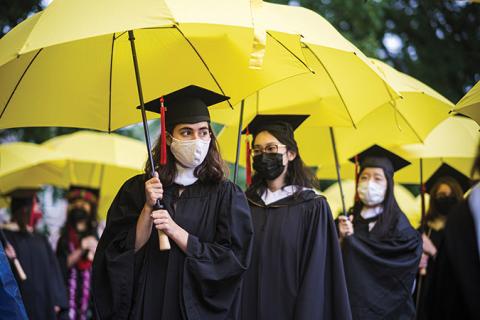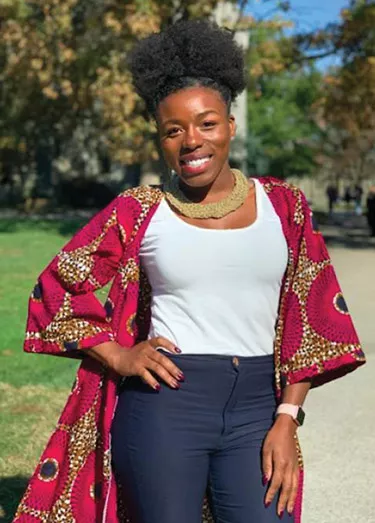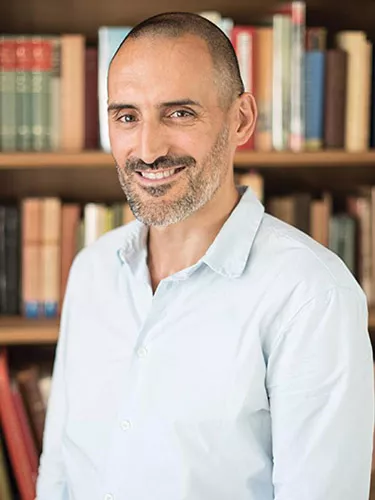For Starters: Summer 2021

1. "Immense Pride"
The cold and rain did nothing to dampen the joy of Bryn Mawr’s 2021 Commencement ceremonies. “You’ve been through a lot this year,” noted President Kim Cassidy. “We’ve all been through a lot. No matter where you’ve completed your studies, your senior year has been a unique one.” Cassidy went on to praise the strength with which the Bryn Mawr class of 2021 faced the unprecedented challenges of this past year. “You pursued your education, and you did so with excellence, commitment, openness, and passion, all while helping to create a better, more just future for Bryn Mawr. For that, I express my love, appreciation, and immense pride in all of you.”
Click here to watch a video of the ceremony.
2. Anti-Racism and Pedagogy
The anti-racism work of Chanelle Wilson, director of the Africana Studies program, has reached a broad audience of late. The assistant professor of education has conducted webinars and workshops about teaching with an anti-racist and decolonial approach in almost a dozen universities since last fall, including Penn State, Washington and Lee, University of Colorado-Boulder, and the University of Kansas. “We’re using the same system that we didn’t even create. There are ways that could be more just,” said Wilson in an article in Newsweek, noting that people may be striving for anti-racism but still operating in a racist system. “I’m trying to work with other faculty and grad students on looking at the way that we can uncover unjust systems and recognizing we can do something about it.” Wilson’s work also drew the attention of C-SPAN’s “Washington Journal,” which tapped her expertise for a discussion on critical race theory as it is applied to education.
3. Kazakh Culture
“My intention with the scholarship is to use my studies of Russophone literature, specifically Russian and Kazakh, to broaden the scope of education in the U.S. with regards to the Russophone world. In my time in Almaty, I hope to engage with the Kazakh poetry and literary scene by participating in (and perhaps hosting) poetry slams, readings, and the like.” — Julia Hablak ’21, one of five Bryn Mawr students from the Class of 2021 who have received Boren Scholarships. The Boren Scholarship Program is designed to increase U.S. knowledge of languages and countries deemed to have security interest for the U.S. Other winners were Tamar Furman ’21, Saskia Holman ’21, Anna West ’21, and Natalia San Antonio ’21.
4. Carbon-Neutral by 2035
Bryn Mawr College plans to be carbon-neutral by 2035. Director of Facilities Nina Bisbee shared the ambitious goal at an event marking Earth Day on April 22, noting that Bryn Mawr has already made significant strides toward greater sustainability in recent years, with a 49 percent reduction in greenhouse gas emissions since 2007.
Recently, the College partnered with ENGIE Resources to receive energy from a wind farm in Pennsylvania. The agreement, which takes effect in June 2022, represents 100 percent of the college’s consumption and includes national Green-e certified renewable energy certificates. The environmental benefits in this agreement are equal to offsetting the CO2 emissions of 13 million pounds of coal burned, or 27,893 barrels of oil, consumed annually. Other steps the College will take to become carbon-neutral include continued HVAC and building envelope improvements and upgrades, solar panel installations, a large-scale tree planting initiative, and conversion of the College’s vehicle fleet to electric.
5. Textiles, Two Ways
This past spring, as part of 360°: Textiles in Context, students learned to card and spin wool as well as how to use polarizing light microscopes to identify textile fibers. This multidisciplinary approach to a topic is typical of a 360° course cluster, which in this case was made up of a chemistry course co-taught by Marianne Weldon and Alicia Walker and a history of art course, also taught by Walker. The chemistry course introduced the science of textiles through hands-on training in the analysis of textile weaving techniques and materials, and the history of art course explored the uses and meanings of textiles in early Byzantine culture.
6. Best French Book on Film
Le Spectateur zéro: Conversation sur le montage (The Spectator Zero: A Conversation About Film Editing), co-written by Julien Suaudeau, lecturer in French and Francophone Studies and director of Film Studies, recently received the 2020 Best French Book on Film award from the Syndicat Français de la Critique de Cinéma. Suaudeau co-wrote the book with film editor Yann Dedet. As a filmmaker, Suaudeau has directed documentaries and short fiction films. As an author, he writes novels that focus on contemporary France as seen through the lenses of colonial and postcolonial history, immigration, laïcité (secularism), terrorism, and socioeconomic inequalities.
7. La Vera Italia
Faculty from the Transnational Italian Studies Department, in collaboration with Bryn Mawr and Haverford students, are creating an Italian-language open educational resource textbook with Haverford Pressbooks that will foster equity by ensuring that all students have access to a zero-cost learning platform and by presenting a realistic, diverse picture of the Italian culture. “Students will have the opportunity to understand the transformations of 21st-century Italy and deepen their awareness of cultural variation through cross-cultural comparisons.” says Chiara Benetollo, visiting assistant professor in the Transnational Italian Studies Department. “They will get to know not only a culture of fine arts, major historical gestures, and great genius, but also testimonies of writers of color interpreting Italy, Italian women criticizing the male-centric view of society, and the ongoing debate on migration.”
8. A Grant to Study Enzymes
Associate Professor of Chemistry Yan Kung has received a three-year, $362,500 grant from the National Institutes of Health to study enzymes that play key roles in the production of isoprenoids, a class of natural compounds with a variety of uses and functions, including many drugs that are used to treat a number of diseases, including cancer and malaria.
Published on: 09/17/2021







